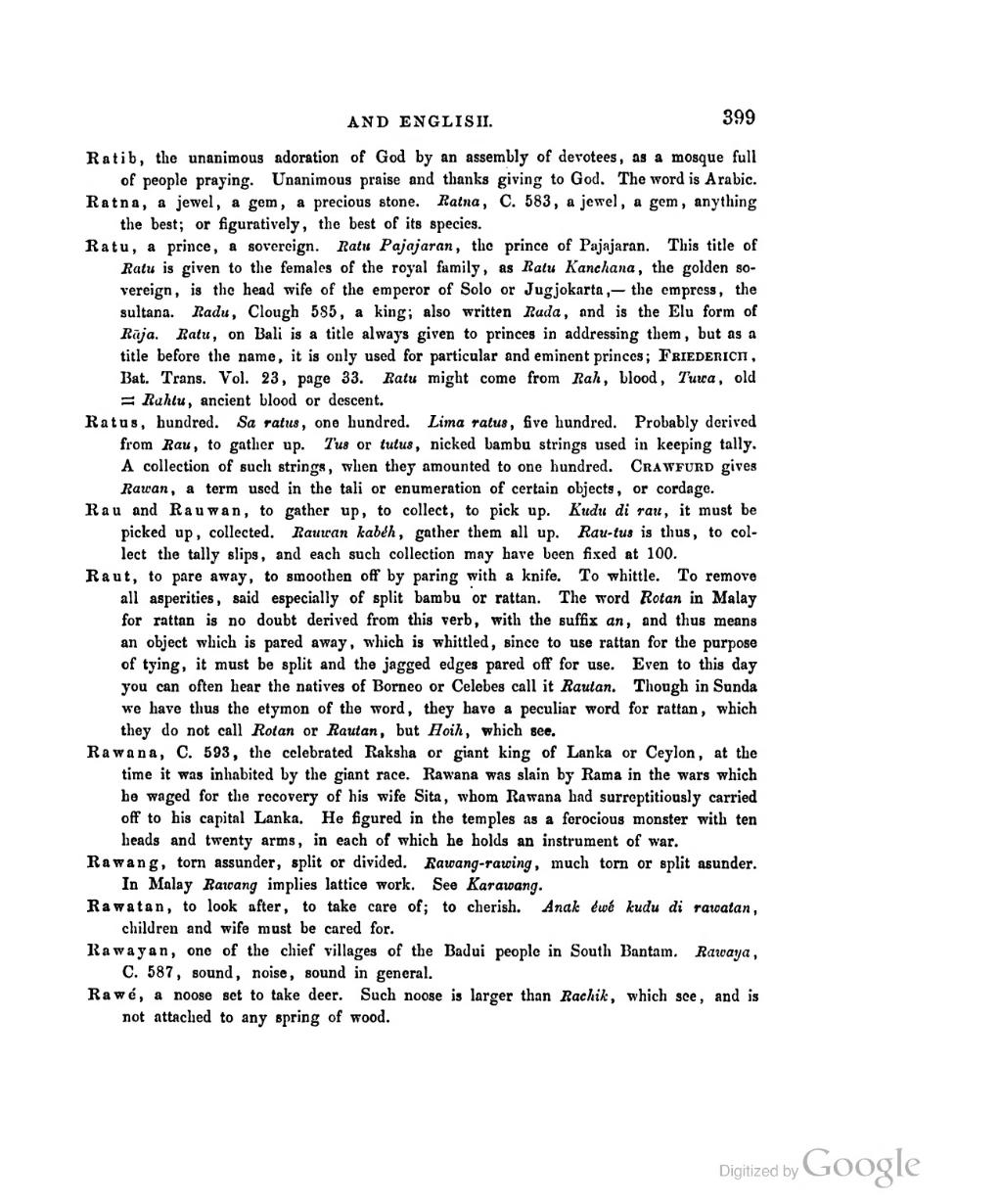Ratib, the unanimous adoration of God by an assembly of devotees, as a mosque full of people praying. Unanimous praise and thanks giving to God. The word is Arabic.
Ratna, a jewel, a gem, a precious stone. Ratna, C. 583, a jewel, a gem, anything the best; or figuratively, the best of its species.
Ratu, a prince, a sovereign. Ratu Pajajaran, the prince of Pajajaran. This title of Ratu is given to the females of the royal family, as Ratu Kanchana, the golden sovereign, is the head wife of the emperor of Solo or Jugjokarta,— the empress, the sultana. Radu, Clough 585, a king; also written Rada, and is the Elu form of Rāja. Ratu, on Bali is a title always given to princes in addressing them, but as a title before the name, it is only used for particular and eminent princes; Friederich, Bat. Trans. Vol. 23, page 33. Ratu might come from Rah, blood, Tuwa, old = Rahtu, ancient blood or descent.
Ratus, hundred. Sa ratus, one hundred. Lima ratus, five hundred. Probably derived from Rau, to gather up. Tus or tutus, nicked bambu strings used in keeping tally. A collection of such strings, when they amounted to one hundred. Crawfurd gives Rawan, a term used in the tali or enumeration of certain objects, or cordage.
Rau and Rauwan, to gather up, to collect, to pick up. Kudu di rau, it must be picked up, collected. Rauwan kabéh, gather them all up. Rau-tus is thus, to collect the tally slips, and each such collection may have been fixed at 100.
Raut, to pare away, to smoothen off by paring with a knife. To whittle. To remove all asperities, said especially of split bambu or rattan. The word Rotan in Malay for rattan is no doubt derived from this verb, with the suffix an, and thus means an object which is pared away, which is whittled, since to use rattan for the purpose of tying, it must be split and the jagged edges pared off for use. Even to this day you can often hear the natives of Borneo or Celebes call it Rautan. Though in Sunda we have thus the etymon of the word, they have a peculiar word for rattan, which they do not call Rotan or Rautan, but Hoih, which see.
Rawana, C. 593, the celebrated Raksha or giant king of Lanka or Ceylon, at the time it was inhabited by the giant race. Rawana was slain by Rama in the wars which he waged for the recovery of his wife Sita, whom Rawana had surreptitiously carried off to his capital Lanka. He figured in the temples as a ferocious monster with ten heads and twenty arms, in each of which he holds an instrument of war.
Rawang, torn assunder, split or divided. Rawang-rawing, much torn or split asunder. In Malay Rawang implies lattice work. See Karawang.
Rawatan, to look after, to take care of; to cherish. Anak éwé kudu di rawatan, children and wife must be cared for.
Rawayan, one of the chief villages of the Badui people in South Bantam. Rawaya, C. 587, sound, noise, sound in general.
Rawé, a noose set to take deer. Such noose is larger than Rachik, which see, and is not attached to any spring of wood.
